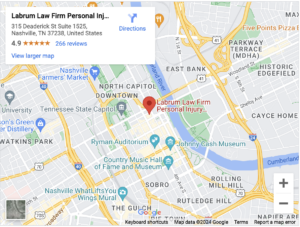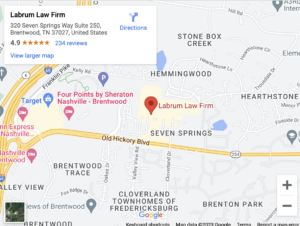
A car accident or other personal injury accident can cause significant damage to your property, even in a minor accident. A property damage claim seeks compensation for damages caused to your car or other personal property during a personal injury accident. Property damage also refers to damage to real property, such as your home or land.
Understanding property damage can help you seek to recover the full compensation you’re entitled to after an accident.
Filing a Property Damage Claim in Nashville, TN
Property damage is included in the category of economic damages as it is a financial loss. You may also have a claim for other financial losses and non-economic damages as well.
Property damage claims seek compensation for all losses and harm caused by a personal injury accident.
When you file a property damage claim, you could receive compensation for:
- Towing charges
- The cost of vehicle repairs
- Property repair or replacement costs
- Vehicle storage fees
- The cost to replace your vehicle if it was totaled
Tennessee drivers are required to have minimum amounts of liability car insurance. Liability insurance pays for damages from an accident that an insured driver caused. You must have a minimum of $25,000 in property damage coverage in Tennessee.
Because Tennessee is an at-fault state for car accidents, an accident victim typically files an insurance claim with the at-fault driver’s insurance provider. However, there could be instances when you might need to file a property damage claim with your insurance company.
First-Party Property Damage Claims bre
First-party property damage claims are filed with your insurance provider. Whether you can file a first-party claim depends on the type of insurance coverage you purchased.
Examples of insurance coverage for first-party claims include:
- Collision coverage – Pays for the repairs to your vehicle if you are involved in a car accident.
- Towing – This coverage reimburses you for reasonable towing charges.
- Rental cars – If you have rental car coverage, your insurance company pays for the cost of a rental car for a specified period.
- Gap insurance – Gap insurance pays the difference between your vehicle’s fair market value and your automobile loan payoff amount.
You are responsible for paying the deductible on your policy. Property damage insurance policies may cover damages or the destruction of personal property as well. If another party is responsible for the accident, your insurance company might pursue a claim against the at-fault party to recoup the amount it paid to you for a first-party claim.
Third-Party Property Damage Claims
A third-party claim is filed with the insurance company for the at-fault party. The insurance company is liable for property damages up to the policy limits if their insured caused the accident. You are not required to pay a deductible when you file a third-party claim. However, you are not guaranteed full value for your vehicle.
If the insurance company accepts liability, it determines whether your vehicle can be repaired or is totaled. A totaled vehicle may still operate. However, the cost of repairs exceeds a percentage of the vehicle’s value. In other words, the insurance company does not believe the vehicle is worth repairing.
The insurance provider should pay the cost of repairs or pay you the fair market value for the vehicle if it is totaled. Several factors impact how much a car is worth.
Factors used to determine the fair market value of an automobile include, but are not limited to:
- The make and model of the vehicle
- The year the vehicle was manufactured
- The mileage at the time of the accident
- Special equipment installed
- The condition of the vehicle before the accident
- The current market value of similar vehicles in the area
A vehicle may be difficult to value if it is a specialty, classic, or vintage. Expensive equipment and add-ons can also make it more challenging to value a vehicle. Obtaining two or three independent appraisals of your car’s value is helpful before accepting a property damage settlement offer.
How Does Comparative Fault Impact a Property Damage Claim for a Nashville Car Accident Claim?
Tennessee uses a modified comparative fault standard for assigning damages after a car accident. You are liable for damages based on your level of fault. Therefore, if you were not at fault in the car crash, you should be able to receive the full value of your damages.
However, if you are partially at fault, your damages are reduced by your level of fault. For example, if a jury decides you are 25% to blame for a rear-end crash, you would only receive up to 75% of your damages.
Tennessee’s comparative fault law has a 50% cap. If your fault exceeds the cap, the other party is not liable for any of your damages.
Get Help With a Property Damage Claim in Nashville, TN
Settling a property damage claim can be frustrating, especially if you are unsure of the value of your vehicle. If the insurance company is giving you the run-around or refusing to pay for repairs or property damage, you may want to consider seeking legal advice. A Nashville personal injury lawyer can answer your questions and explain your legal options during a free consultation. Contact us today at (615) 685-8546 for a free consultation.


